From the big screen to the concert hall

On Sunday in Royce Hall, the American Youth Symphony will perform works by noted Hollywood composer for film scores, Jerry Goldsmith.
By Katie Meschke
April 29, 2010 9:06 p.m.
Film music rarely ever graces the stage away from the screen, but on Sunday, the American Youth Symphony will perform works by noted Hollywood composer Jerry Goldsmith. The concert, which will follow a symposium discussing the music and life of Goldsmith, is the second of a three-part chronological series dedicated to showcasing some of Goldsmith’s works, including the scores for “Alien,” “The Omen” and “Star Trek.”
Goldsmith, one of the few noted film composers who was born and raised in Los Angeles, composed scores for more than 200 films before his passing in 2004.
“Most film composers live and work in Los Angeles, so it’s part of our heritage and history,” said David Newman, film composer, conductor and president of the American Youth Symphony board of directors. “Films are known all over the world, and on all those films, it is mostly symphonic or a symphonic type of music, so we wanted to celebrate that with one of our own. … Goldsmith just happens to be one of the top film composers of the 20th century.”
Part of the greatness of Goldsmith’s works lies in his ability to compose music that is appealing not only with the movie, but standing alone onstage.
“I really love his music for his ability to write a fantastic melody, to write a theme that really encapsulates what’s going on in the movie,” said Holley Replogle, UCLA music professor and member of the chorus. “It’s something that he thought was really valuable, being able to write a theme. There was a part of him that was so experimental, yet the other part of him had this deep respect for the classical Hollywood model. … (A theme) really gives you something to grab onto, to ground you in the story or ground you with the character or landscape.”
As a highly trained composer, Goldsmith knew exactly how to write for each instrument or voice, which not only allowed him to compose memorable melodies, but also let him push the musicians to the edges of their ability. His music for “The Omen” requires the soprano vocalists to sing at really high pitches and even scream to create a twisted, eerie sound.
“Jerry knew what he was doing by pushing the choir to extremes for this,” Replogle said. “”˜The Omen’ was one of the first major summer blockbusters, so it helps the bigness of it, to have a big score. It’s a huge epic battle between the forces of hell and eventually the forces of heaven. We sing the big final battle, which is really intense and very high, but also very big.”
Despite the music’s power to excite away from the big screen, Goldsmith’s music and film music in general has a history of being absent from live performances. “Film music has not been taken seriously enough in the concert hall,” said Jon Burlingame, leader of the pre-concert symposium. “The best film music is that which works within the context of that picture, but secondly, can be taken out of the picture and performed as music apart from the original context for which it was written.”
Part of the reason film music has missed out on live performances is the difficulty in obtaining scores. According to Newman, Metro-Goldwyn-Mayer Studios Inc. purposely destroyed the scores for “The Wizard of Oz” in the ’60s because they were taking up space.
“(Scores) are written to be recorded, and once they are recorded, they are looked at by the entity that paid for it … as finished. It’s not really about being performed live,” Newman said. “They thought the scores and parts were pointless to hold onto.”
Another reason the American Youth Symphony undertook this project was to make the scores accessible to orchestras. By gathering what bits and pieces of film scores they could get their hands on, the symphony has been able to transcribe the music and reprint it, making it available for others to play.
“If the music works on the concert stage as well as in the picture, then not only has it done its job, but it’s now out there for people to enjoy on its own,” Burlingame said. “We want to make sure the Goldsmith legacy is appreciated and properly understood, and more than anything, performed. … Not only are we celebrating the music and legacy of Jerry Goldsmith, but we’re helping to ensure that the legacy goes on for years to come.”


